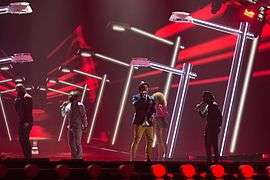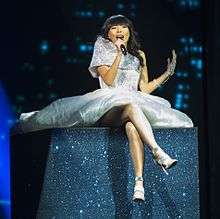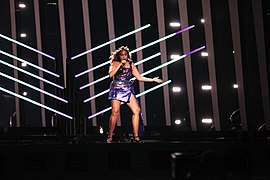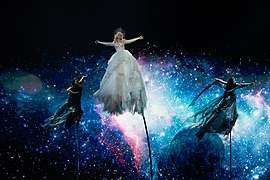Australia in the Eurovision Song Contest
Australia has participated in the Eurovision Song Contest five times since their debut in 2015 and has been in the top ten four times. They are the second country outside of the Eurasia region with Morocco competing in the 1980 contest. The country's best result in the contest is a second-place finish for Dami Im in 2016. Australia also finished in the top ten in three of its other appearances in the contest, with Guy Sebastian finishing fifth in 2015, and both Isaiah Firebrace and Kate Miller-Heidke finishing ninth in 2017 and 2019.
| Australia | |
|---|---|
.svg.png) | |
| Member station | SBS |
| National selection events | National final
Internal selection
|
| Participation summary | |
| Appearances | 5 (5 finals) |
| First appearance | 2015 |
| Best result | 2nd: 2016 |
| External links | |
| SBS page Eurovision – Australia Decides website | |
| Australia's page at Eurovision.tv | |
Australia in the Eurovision Song Contest 2020 | |
Initially, Australia's participation in the 2015 contest was set to be a one-off event, the plan being only to perform again the following year had they won, but it was confirmed in November 2015 by SVT that they would participate in the 2016 contest.[1] Australia's participation in the contest has been confirmed by the European Broadcasting Union and Special Broadcasting Service (SBS) until 2023.[2]
History
1983–2014
Australian broadcaster Special Broadcasting Service (SBS) first broadcast the Eurovision Song Contest in 1983 and has continued to do so every year since. The contest has attracted a strong viewing audience in Australia, primarily because a significant proportion of the population have ancestry in Europe (in particular in the United Kingdom). Early broadcasts of the Contest in Australia either featured no commentary or used the United Kingdom's commentary as transmitted by the BBC. In 2001, actress and comedian Mary Coustas provided commentary for the Contest performing as her comedic character Effie.[3] In 2003 and 2004, SBS presenter Des Mangan provided commentary for the Australian audience. From 2009, Julia Zemiro and Sam Pang were assigned as commentators for the competition by SBS.[4][5] 2017 saw SBS replace the commentators with comedian Joel Creasey and TV and radio personality Myf Warhurst. In addition to broadcasting the contest, SBS has also broadcast the 50th and 60th anniversary programmes.
From 2010 to 2014, SBS allowed Australian viewers to participate in their own televote for the Grand Finals.[6] However, these votes were not counted at the actual contest and did not affect the overall result. The SBS commentary team and Australian delegation were awarded a commentary booth of their own at the 2012 contest in Baku. They have been allocated a commentary booth every year since.
Australia's first appearance in the international broadcast of the Eurovision Song Contest occurred on 14 May 2013 during the first semi-final in Malmö, Sweden. A short pre-recorded video titled "Greetings from Australia" (also referred to as "Why Australia Loves Eurovision"), submitted by SBS and hosted by Julia Zemiro, was broadcast during the interval acts.[7] This presentation marked 30 years of broadcasting the Eurovision Song Contest in Australia, and was preceded the week leading up to the contest by a locally broadcast documentary, also hosted by Zemiro, titled The Heart of Eurovision.[8] On 24 March 2014, the Danish broadcaster DR gave permission to SBS to perform as an interval act in the second semi-final of Eurovision Song Contest 2014. One day later, on 25 March, Jessica Mauboy was internally selected to perform.[9] On 8 May 2014, Mauboy sang her song "Sea of Flags".[10]
2015–present: Participation
Special Broadcasting Service (SBS) made the country's debut at the 2015 Contest with the song "Tonight Again" a song written and performed by Guy Sebastian. Although Australia is outside the European Broadcasting Area, the European Broadcasting Union and Austrian host broadcaster ORF decided to permit an Australian entry to commemorate the 60th Contest. The special circumstances surrounding Australia's entry and "to not reduce the chances" of the semi-final participants led the organisers to allow Australia to compete directly in the grand final without pre-qualification.[11] In the event that Australia should win the Eurovision Song Contest, the EBU had confirmed that in accordance with the rules, Australia would not host the event in the southern hemisphere, and instead would co-host the contest within a country in the EBU.[12] Further to the EBU's statement it was confirmed that Germany and their broadcaster Norddeutscher Rundfunk (NDR) would be the first choice, and United Kingdom's broadcaster British Broadcasting Corporation (BBC) being the back-up hosts should Germany decline.[12]
Although Australia's participation in 2015 was announced as a one-off event, it was confirmed on 17 November 2015 that Australia would participate in the 2016 contest. Unlike in 2015, Australia did not receive automatic qualification.[13] On 7 October 2015, it was announced that Australia would make its debut at the Junior Eurovision Song Contest 2015 after SBS was invited to perform in the contest.[14] The Australian candidate for the 2016 contest was Dami Im with her song "Sound of Silence" which won the second semi final before finishing second behind Ukraine.[15]
Australia continued its participation at the 2017 contest following their success the previous year.[16] On 7 March 2017 at the Paris Cat Jazz Club in the city of Melbourne, Australia, SBS announced former X Factor Australia winner Isaiah Firebrace as Australia's entry into the 62nd instalment of the contest. With the song "Don't Come Easy", Isaiah participated in the first semi-final on 9 May, then the finals on 13 May in which Australia placed 9th.[17]
Australia competed in the 2018 contest, selecting Jessica Mauboy as the artist to represent the country.[18][19] Although this continued Australia's track record of perfect attendance in the final (a record it now only shares with Ukraine), it was the first instance of them not finishing in the top ten, ending in twentieth place with 99 points (only nine of which came from the televote, the first time Australia finished last in the televote).
It was announced that for the first time, 2019 will provide Australians the opportunity to choose their Eurovision representative. The Eurovision - Australia Decides national final took place on 9 February 2019, with a 50/50 say between an Australian jury and a televote to determine who will represent Australia at the 2019 contest in Tel Aviv, Israel. Eurovision – Australia Decides was hosted in Gold Coast, Queensland by Myf Warhurst and Joel Creasey.[20] The winner was Kate Miller-Heidke with the song "Zero Gravity". Electric Fields, who were the runner-up in Australia Decides, were selected as the announcers of Australia's jury points. Australia finished 9th in the 2019 contest, after winning the First Semi-Final.
SBS announced it would host Eurovision – Australia Decides – Gold Coast 2020 to choose their representative for the 2020 contest. The event was held on the Gold Coast from 7–8 February.[21] Australia's participation in the contest has been confirmed by the European Broadcasting Union and SBS until 2023.[2]
Contestants
1 |
Winner |
2 |
Second place |
X |
Entry selected but did not compete |
| Year | Artist | Language | Title | Final | Points | Semi | Points |
|---|---|---|---|---|---|---|---|
| Guy Sebastian | English | "Tonight Again" | 5 |
196 |
Automatic finalist[lower-alpha 1] | ||
| Dami Im | English | "Sound of Silence" | 2 |
511 |
1 |
330 | |
| Isaiah | English | "Don't Come Easy" | 9 |
173 |
6 |
160 | |
| Jessica Mauboy | English | "We Got Love" | 20 |
99 |
4 |
212 | |
| Kate Miller-Heidke | English | "Zero Gravity" | 9 |
284 |
1 |
261 | |
| Montaigne | English | "Don't Break Me" | Contest cancelled[lower-alpha 2] X | ||||
| Montaigne | |||||||
- The organisers allowed Australia to compete in the grand final without pre-qualification due to the special circumstances surrounding Australia's entry and so as "to not reduce the chances" of the semi-final participants.[22]
- The 2020 contest was cancelled due to the COVID-19 pandemic.
Other awards
Marcel Bezençon Awards
| Year | Award | Song | Composer(s) Lyrics (l) / Music (m) |
Performer | Final | Points | Host city | Ref. |
|---|---|---|---|---|---|---|---|---|
| 2016 | Composer Award | "Sound of Silence" | Anthony Egizii, David Musumeci | Dami Im | 2 | 511 | [23] | |
| 2019 | Artistic Award | "Zero Gravity" | Kate Miller-Heidke, Keir Nuttall, Julian Hamilton | Kate Miller-Heidke | 9 | 285 | [24] |
Related involvement
Heads of delegation
The public broadcaster of each participating country in the Eurovision Song Contest assigns a head of delegation as the EBU's contact person and the leader of their delegation at the event. The delegation, whose size can greatly vary, includes a head of press, the contestants, songwriters, composers and backing vocalists, among others.[25]
| Year | Head of delegation | Ref. |
|---|---|---|
| 2015–2019 | Paul Clarke | |
| 2020 | Josh Martin |
Jury members
A five-member jury panel consisting of music industry professionals is made up for every participating country for the semi-finals and Grand Final of the Eurovision Song Contest, ranking all entries except for their own country's contribution. The juries' votes add 50% to the overall result alongside televoting.[27]
| Year | 1st member | 2nd member | 3rd member | 4th member | 5th member | Ref. |
|---|---|---|---|---|---|---|
| Amanda Pelman | Richard Wilkins | Danielle Spencer | Ash London | Jake Stone | ||
| Monica Trapaga | Shannon Noll | Myf Warhurst | James Mathison | Craig Porteils | ||
| Lucy Durack | Natasha Cupitt | Steven Capaldo | Jackie Loeb | Peter Hayward | ||
| Richard Wilkins | Zan Rowe | Jordan Raskopoulos | L-FRESH the Lion | Millie Millgate | ||
| Mark Humphries | Christine Anu | Lewis Hobba | Alice Chance | Mark Cummins |
Commentators and spokespeople
| Year | Commentator | Dual commentator | Spokesperson | Ref. |
|---|---|---|---|---|
| 2001 | Effie (Mary Coustas) | None | Did not participate | [3] |
| 2002 | Terry Wogan[lower-alpha 1] | None | Did not participate | |
| 2003 | Des Mangan | None | Did not participate | [3][33] |
| 2004 | Des Mangan | None | Did not participate | [33] |
| 2005 | Terry Wogan[lower-alpha 1] | None | Did not participate | [34] |
| 2006 | Terry Wogan[lower-alpha 1] | None | Did not participate | |
| 2007 | Terry Wogan[lower-alpha 1] | None | Did not participate | |
| 2008 | Terry Wogan[lower-alpha 1] | None | Did not participate | |
| 2009 | Julia Zemiro | Sam Pang | Did not participate | [35] |
| 2010 | Julia Zemiro | Sam Pang | Did not participate | [35] |
| 2011 | Julia Zemiro | Sam Pang | Did not participate | [35] |
| 2012 | Julia Zemiro | Sam Pang | Did not participate | [35] |
| 2013 | Julia Zemiro | Sam Pang | Did not participate | [35] |
| 2014 | Julia Zemiro | Sam Pang | Did not participate | [35] |
| 2015 | Julia Zemiro | Sam Pang | Lee Lin Chin | [35][36] |
| 2016 | Julia Zemiro | Sam Pang | Lee Lin Chin | [35][37] |
| 2017 | Myf Warhurst | Joel Creasey | Lee Lin Chin | [38] |
| 2018 | Myf Warhurst | Joel Creasey | Ricardo Gonçalves | [39] |
| 2019 | Myf Warhurst | Joel Creasey | Electric Fields | [40] |
Incidental participation
Although not actively participating at the Eurovision Song Contest prior to the 2013 semifinal interval presentation, Australia has appeared in the contest incidentally in a number of ways:
- Peter Doyle and Marty Kristian, both Australians, represented the United Kingdom as part of the New Seekers, who performed "Beg, Steal or Borrow" at the 1972 contest in Edinburgh. The song, co-written by Australian Tony Cole, finished second with 114 points.[41]
- English-born Australian singer-songwriter Olivia Newton-John represented the United Kingdom in 1974 (prior to Australian broadcast of the contest) in Brighton with the song "Long Live Love", finishing in 4th place with 14 points.[41]
- John Farrar, who was born in Melbourne, performed as part of the Shadows for the United Kingdom at the 1975 contest.[41]
- Martin Lee, singer in Brotherhood of Man, which won the 1976 contest, spent several years of his childhood in Australia.[41]
- Austria paid tribute to Australia in 1977 in London with their entry "Boom Boom Boomerang" performed by Schmetterlinge. The song was considered controversial at the time due to being the first song to openly mock the contest itself.
- Johnny Logan, winner of the contest in 1980 and 1987 for Ireland (and writer of the winning song for Ireland at the 1992 contest), was born in Frankston, Victoria in 1954, but moved with his family back to Ireland in 1957 aged 3.[41]
- In 1996 in Oslo, Norway, Australian singer Gina G represented the United Kingdom with her performance of "Ooh Aah... Just a Little Bit".[41]
- Jane Comerford, who was born in Newcastle, New South Wales, performed in the 2006 contest for Germany as a part of Texas Lightning with the song "No No Never", which took 14th place and 36 points.[42]
- Australians Craig Porteils and Cameron Giles-Webb co-wrote the song "This Is Our Night" which was performed by Sakis Rouvas for Greece at the 2009 contest.[41]
- Katrina Noorbergen, an Australian living in Berlin, co-wrote the song "A Million Voices" which was performed by Polina Gagarina for Russia at the 2015 contest. She also performed as one of Gagarina's backing singers in the contest.[43]
- Tonino Speciale, who grew up in Western Sydney, co-wrote the song "Black Smoke" which was performed by Ann Sophie for Germany at the 2015 contest.[43]
- Mary-Jean O'Doherty, an American-born and half-Australian opera singer, performed as part of the group Genealogy for Armenia at the 2015 contest.[44]
- Anja Nissen, who is from the Blue Mountains of New South Wales but is the child of Danish parents, represented Denmark at the 2017 contest in Kiev, finishing in 20th place with 77 points. The song, "Where I Am", was co-written by Australian songwriters Angel Tupai and Michael D'Arcy.[45][46]
- Australian singer-songwriter and Eurovision – Australia Decides 2019 competitor Alfie Arcuri co-wrote Cyprus's entry for the 2020 contest "Running", which was to be performed by Sandro Nicolas. The contest was later cancelled due to the COVID-19 pandemic.
Photo gallery
See also
- Australia in the Eurovision Asia Song Contest
- Australia in the Junior Eurovision Song Contest
- Australia in the ABU Radio Song Festival
- Australia in the ABU TV Song Festival
Notes and references
Notes
- Via the BBC.
References
- "Australien är klar för Eurovision Song Contest 2016 i Stockholm". Sveriges Television. Retrieved 17 November 2015.
- "Australia secures a spot in Eurovision until 2023". Aussievision | Eurovision from Down Under. Retrieved 2019-02-12.
- Wright, Sharleen (26 January 2011). "The special relationship: Australia and its love of Eurovision". escinsight.com. Retrieved 4 December 2019.
- Nicholson, Sarah (2008-05-21). "Top of the Euro pops". Courier Mail. news.com.au. Retrieved 2008-05-26.
- Knox, David (2009-04-16). "Airdate: Eurovision 2009". TV Tonight. Retrieved 2009-04-16.
- "Australian televoters choose their winner". Eurovision.tv. Retrieved 11 February 2015.
- "Australia's loyal fandom earns Eurovision nod". The Sydney Morning Herald. Retrieved 2016-02-27.
- "Australia: 2012 coverage a big success". Eurovision.tv. Retrieved 2016-02-27.
- Storvik-Green, Simon (25 March 2014). "Australian superstar to sing at Eurovision". Eurovision.tv. European Broadcasting Union. Retrieved 11 February 2015.
- Vincent, Peter (9 May 2014). "Jessica Mauboy performs at Eurovision Song Contest". smh.com.au. The Sydney Morning Herald. Retrieved 11 February 2015.
- "Australia participate in the 60th Eurovision". Eurovision.tv. EBU. 10 February 2015. Retrieved 11 February 2015.
- Granger, Anthony (13 May 2017). "What happens if Australia wins the Eurovision Song Contest?". eurovoix.com. Eurovoix. Retrieved 13 May 2017.
- "Australia To Return To The Eurovision Song Contest". EBU. Retrieved 17 November 2015.
- Fisher, Luke James (7 October 2015). "Australia joins to make it 'Super 17' at Junior Eurovision in Sofia!". junioreurovision.tv. European Broadcasting Union. Retrieved 7 October 2015.
- Roxburgh, Gordon (14 May 2016). "Ukraine wins 2016 Eurovision Song Contest". eurovision.tv. European Broadcasting Union. Retrieved 14 May 2016.
- Jordan, Paul (31 October 2016). "43 countries to participate in Eurovision 2017". eurovision.tv. European Broadcasting Union. Retrieved 31 October 2016.
- "Isaiah Firebrace represented Australia at the 2017 Eurovision Song Contest and placed 9th". Guide. Retrieved 2017-03-24.
- Knox, David (24 August 2017). "Australia confirmed for Eurovision 2018!". TV Tonight. Retrieved 24 August 2017.
- "SBS confirms Jessica Mauboy will represent Australia at Eurovision 2018 with her song "We got Love"". wiwibloggs. 2017-12-11. Retrieved 2017-12-11.
- "We're opening our song submission for Eurovision 2019!". SBS. October 14, 2018. Retrieved November 3, 2018.
- "Eurovision Australia Decides - dates announced". Aussievision.
- "Australia to compete in the 2015 Eurovision Song Contest". eurovision.tv. EBU. 10 February 2015. Retrieved 18 February 2020.
- "Winners of the Marcel Bezençon Awards 2016". Eurovision TV. 15 May 2016. Retrieved 23 May 2019.
- "Here are the winners of the 2019 Marcel Bezençcon Awards". Eurovision TV. 18 May 2019. Retrieved 23 May 2019.
- "Heads of Delegation". European Broadcasting Union. Retrieved 27 May 2019.
- Granger, Anthony (20 February 2020). "Australia: Josh Martin Named New Head of Delegation For Eurovision". Eurovoix. Retrieved 21 February 2020.
- "Exclusive: These are the judges who will vote in Eurovision 2019". European Broadcasting Union. 30 April 2019. Retrieved 5 November 2019.
- "The Australian Eurovision Jury". SBS Eurovision. SBS. 1 May 2015. Retrieved 15 May 2016.
- "Australia's Eurovision 2016 jury and spokesperson is revealed!". SBS Eurovision. SBS. 2 May 2016. Retrieved 15 May 2016.
- "SBS announce Australia's 2017 Eurovision Jury members". SBS News. 8 May 2017. Retrieved 11 May 2018.
- "Meet Australia's 2018 Eurovision jury and Australian spokesperson". SBS News. 30 April 2018. Retrieved 11 May 2018.
- "Meet Australia's 2019 Eurovision jury and Australian spokespeople". SBS News. 30 April 2019. Retrieved 17 May 2019.
- "Eurovision scandal - SBS dumps Wogan! - inthemix Forums". inthemix.com.au.
- "Eurovision Australian Eurovision Song Contest coverage confirmed - ESCToday.com". April 21, 2005. Retrieved 28 May 2020.
- Knox, David (17 November 2015). "SBS Upfronts: 2016: Eurovision, drama, comedy & docos". TV Tonight. Retrieved 17 November 2015.
- "Honestly, did you really think anybody else would be up to the task? #TheFeedSBS #SBSEurovision". Twitter. The Feed SBS. Retrieved 18 May 2015.
- "Stockholm Calling! How To Be A Memorable Eurovision Voting Correspondent". SBS. 29 April 2016. Retrieved 5 November 2019.
- "SBS's new Eurovision hosts are…". Guide. Retrieved 2017-03-24.
- "Australia: Ricardo Goncalves Replaces Lee Lin Chin as Spokesperson". Eurovoix. 30 April 2018. Retrieved 30 April 2018.
- "Australia: Electric Fields announced as latest spokespersons for Eurovision 2019". Wiwibloggs. 30 April 2019. Retrieved 30 April 2019.
- Lennon, Troy (11 February 2015). "Aussies hit the high notes at Eurovision". The Daily Telegraph. Retrieved 13 May 2016.
- McCathie, Andrew (18 March 2006). "Australian singer strikes a blow for Eurovision". The Age. Retrieved 13 May 2016.
- Moran, Jonathan (26 May 2015). "Songwriter Katrina Noorbergen was part of Australia's growing presence at Eurovision". The Daily Telegraph. Retrieved 13 May 2016.
- Vincent, Peter (13 March 2015). "Eurovision 2015: Australian Mary-Jean O'Doherty is a rival country's secret weapon". The Sydney Morning Herald. Retrieved 13 May 2016.
- AAP (12 May 2017). "Eurovision 2017: Anja Nissen second Australian into final". The Australian. Retrieved 13 May 2017.
- Granger, Anthony (25 February 2017). "DENMARK: SELECTS ANJA NISSEN FOR THE EUROVISION SONG CONTEST 2017". eurovoix.com. Eurovoix.


._Photo_347.jpg)

